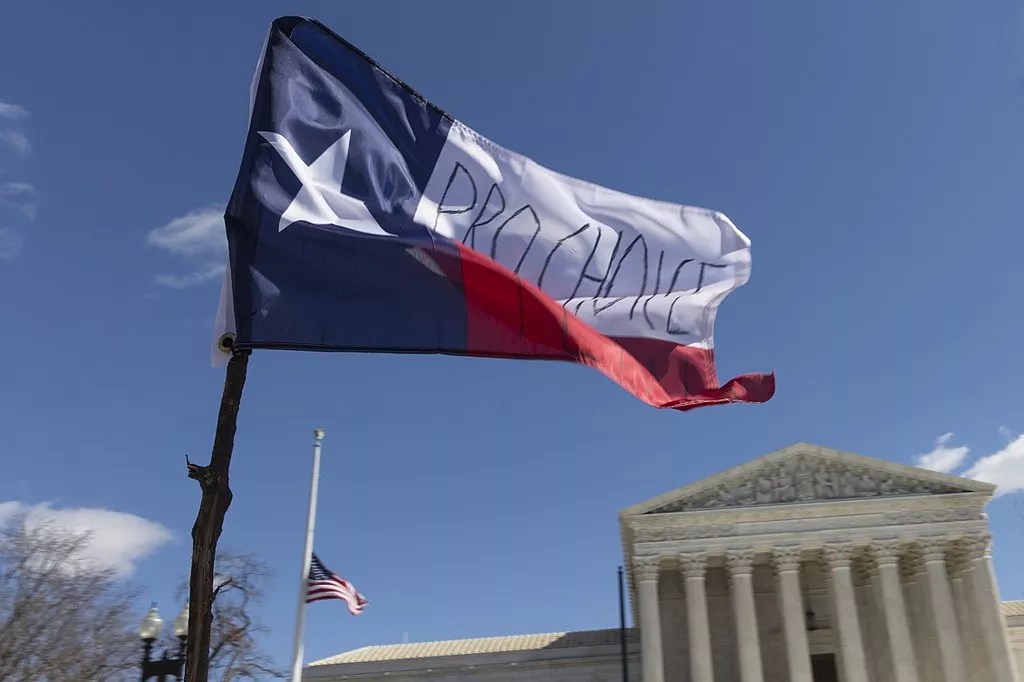
Lorie Shaull from Washington, United States, CC BY-SA 2.0 via Wikimedia Commons

Audio By Carbonatix
The U.S. Department of Justice has filed a lawsuit against Texas over Senate Bill 8, the harsh new abortion law that bars women from receiving the procedure at around six weeks, which is often too soon for a woman to know they’re pregnant.
During a press conference Thursday, Attorney General Merrick Garland said the new law, which was signed by Gov. Greg Abbott in May and went into effect last week, “deputizes bounty hunters” and “vigilantes” to sue women who receive abortions and those who help them obtain the procedure.
Garland said the law is “clearly unconstitutional under longstanding Supreme Court precedent,” and explained that the DOJ has requested an injunction to freeze SB 8 in the meantime.
“This kind of scheme, to nullify the Constitution of the United States, is one that all Americans, whatever their politics or party, should fear,” the attorney general added.
The lawsuit, filed by President Joe Biden’s administration Thursday, accuses Texas of acting in “open defiance of the Constitution” by adopting and enacting SB 8.
“It takes little imagination to discern Texas’s goal – to make it too risky for an abortion clinic to operate in the State, thereby preventing women throughout Texas from exercising their constitutional rights, while simultaneously thwarting judicial review,” the suit reads.
Last week, the U.S. Supreme Court voted 5-4 to allow SB 8 to go into effect, a move that prompted Biden to announce a “government effort” to challenge the legislation.
Several other states have passed into law similar anti-abortion legislation, but federal judges have blocked it from going into effect. Texas, however, is the only state to allow private citizens to sue their counterparts.
SB 8, dubbed the “heartbeat bill” by its mostly Republican backers, was one of several anti-abortion bills introduced in the Texas Legislature this year. (Other Republican-backed proposals included a bill that would have required a court to appoint a lawyer to represent a fetus in certain cases, but they didn’t pass into law.)
Earlier this week, Democrats in the U.S. House wrote an open letter to Garland, asking the attorney general to “use the full power of the Department of Justice to defend a woman’s constitutional right to choose an abortion.”
Reproductive rights groups and other advocates have criticized SB 8 and other restrictions on abortion in Texas, one of the most difficult states in which to get an abortion. Many have blasted the law for requiring victims of rape or incest to carry their pregnancies to term.
Meanwhile, Gov. Abbott misleadingly claimed earlier this week that the law doesn’t, in fact, require such victims to carry their pregnancies to term.
“It’s powerful to see this bold of an action coming from the federal government.” – Rosann Mariappuram, Jane’s Due Process
“Obviously, it provides at least six weeks for a person to be able to get an abortion, and so, for one, it doesn’t provide that,” Abbott said. “That said … rape is a crime, and Texas will work tirelessly to make sure that we eliminate all rapists from the streets of Texas by aggressively going out and arresting them and prosecuting them and getting them off the streets.”
“In 2019, 14,656 rapes were reported in Texas, according to the state’s Department of Public Safety. About 2,200 people were arrested for rape that same year,” USA Today reports.
Fact-checkers at newspapers nationwide also pointed out that the six-week clock starts from the moment someone’s last period ends, which effectively leaves most individuals with little to no time to receive an abortion.
“It’s powerful to see this bold of an action coming from the federal government,” said Rosann Mariappuram, executive director of the Texas-based reproductive rights group Jane’s Due Process. “We were very disappointed in seeing the U.S. Supreme Court refuse to rule on the constitutionality of the law.”
She added, “It’s not only going to have an impact on Texas, but it’s going to impact any other state that’s considering this [kind of law].”
But Mariappuram added that other worrisome laws also went into effect on Sept. 1, including a so-called “trigger law” that would immediately ban all abortions in Texas if the Supreme Court overturned Roe v. Wade.